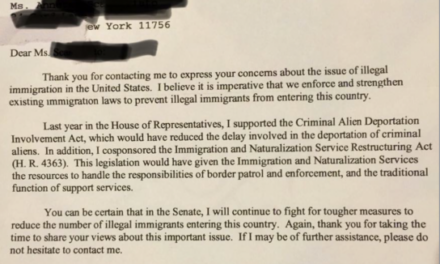We support our Publishers and Content Creators. You can view this story on their website by CLICKING HERE.
On February 21, 2020, in Amador County, California, police found the dead body of Philip Haney, 66, hardly the typical Sierra foothills resident. A UC Riverside alum, Haney worked as an agricultural entomologist in the Middle East, where he studied Arabic and the Quran. With that background, Haney seemed a good fit for the Department of Homeland Security, but DHS bosses had a problem.
As Haney told The Hill in 2016, “DHS ordered me to scrub records of Muslims with terror ties,” that is, “to delete or modify several hundred records of individuals tied to designated Islamist terror groups like Hamas from the important federal database, the Treasury Enforcement Communications System (TECS).” That year Haney authored See Something Say Nothing: A Homeland Security Officer Exposes the Government’s Submission to Jihad.
In November of 2019, Haney told the Washington Examiner he had “a severely hyper-organized archive of everything that’s happened” since See Something, Say Nothing. As the whistleblower explained, “my intention is to have it ready by early to mid-Spring of 2020 (just before the political sound wave hits), then ride that wave all the way to the Nov. elections.” On February 21, 2020, Haney turned up dead by gunshot.
The Amador County Sheriff’s Office (ACSO) brought in the FBI, and Gary Redman, who took over as sheriff in 2021, is a graduate of the FBI academy. The bureau had custody of Haney’s computer, thumb drives, and assorted documents, but no word of the contents. The ACSO declared the case closed but its own documents tell a different story.
According to forensic pathologist Katherine Raven MD, cause of death was a “perforating gunshot wound of torso,” that was “consistent with contact range.” Raven found an exit wound on the left side of Haney’s back and abrasions on both knees. She signed out a “homicide autopsy,” but that was to change.
The Amador County sheriff doubles as the coroner and the chief deputy coroner is a sergeant assigned to the investigations division. In a physician/coroner’s amendment dated February 14, 2022, Sgt. Patrick Weart, listed “apparentself-inflicted gunshot wound” as the cause of death. The document does not list Weart’s medical qualifications to make such a judgment. ACSO Lieutenant Jim Cardoza took it to another level.
Three binders of Haney’s materials were “said to contain whistleblower documents.” Cardoza found 56 pages “which appeared to be contraband,” but there was more to it. The FBI put Cardoza in touch with the DHS “Office of Special Responsibility” in San Francisco. Agent Eric Wilson ruled that the dead man harbored “contraband” and was guilty of fraud, illegal disclosure and other offenses under five federal laws.
Three binders “said to contain whistleblower documents” were doubtless part of the “severely hyper-organized archive” Haney was gathering for the “National Security Meltdown” book he mentioned in 2019. If anybody thought that was what the FBI sought from the start, it would be hard to blame them.
For all but the willfully blind the FBI is now an unaccountable partisan force. Congress needs to gear up another Select Committee on Assassinations to investigate the deaths of Philip Haney and slain DNC official Seth Rich, among others. In the meantime, consider these excerpts from “DHS whistleblower dead ahead of plan to expose national security corruption,” by Laura Hoy, posted by CNN on February 23, 2020, two days after Philip Haney was found dead by gunshot in Amador County:
The untimely death of Philip Haney over the weekend has created another storm of political conspiracy theories. Haney gained notoriety in 2016 when he came forward as a whistleblower while working at the Department of Homeland Security (DHS).
Haney had been missing since Feb. 19 and was found two days later in what police have ruled a suicide.
Haney’s controversial accusations that the Obama administration could have prevented terrorist attacks were polarizing among Americans. He later went on to write a book detailing his time at the DHS, called, “See Something, Say Nothing: A Homeland Security Officer Exposes the Government’s Submission to Jihad.”
According to sources close to Haney, he was planning to release a sequel to the book this spring. Haney allegedly hoped the new book would help boost support for Donald Trump in the upcoming election.
Haney’s death is likely to become political ammo for Republicans heading into the 2020 presidential elections.
CNN reports, you decide.

 Conservative
Conservative  Search
Search Trending
Trending Current News
Current News 




